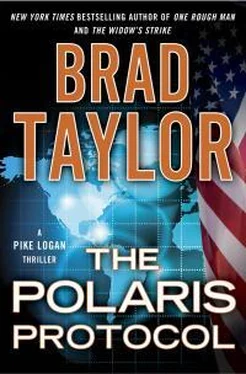In essence, while incredibly complicated in execution, the concept of GPS was fairly simple. A receiver acquired a signal from a satellite, along with how long it took that signal to reach it. Once it had three or more of those signals, complete with the time it took each to reach its location, it simply triangulated its position based on its inherent knowledge of the satellites’ location. Easy.
The key was the timing signal, as it had to be nanosecond-precise to get an accurate location, and that was what the military adjusted. All thirty-five of the satellites currently in orbit had an application called selective availability embedded within them. With a flip of a switch, the military could turn on this feature for any satellite they wanted, which, in essence, simply altered the timing broadcast. In other words, the receiver would think it took X nanoseconds to reach it, when it really took Y. Thus, the receiver would triangulate an incorrect location. The military controlled the degree of offset, and the greater the aberration, the greater the error, but civilian use of the system had overcome the military monopoly.
The Department of Defense had begun to lose control of its creation since its inception, like water eroding a riverbank. It was just too good an application not to be capitalized on in the civilian market, even with selective availability. GPS became more and more entrenched in the public world, with the timing feature becoming embedded into the United States’ national architecture. Everything from bank transactions to cell phone towers to power grids used it. So much so that President Bill Clinton abolished the use of selective availability in the year 2000, and the new Block III satellites scheduled for launch in the next decade didn’t even include the feature.
But it was still there on the legacy systems that were currently in space. All Booth had done was create a program that could access it. With his own personal switch, he could cause every single GPS-enabled device to fail—including the military-only encrypted signal—whether it was a red light in New York City that solely needed accurate timing or a train switchyard that needed accurate positioning of its customers. Or, in his mind, a corrupt banking system that utilized GPS timing for every single transaction and a fleet of Predator UAVs armed with Hellfire missiles looking for something to kill.
Creating the program had been simple. Getting into the satellites was what had proven hard. The 2nd Space Operations Squadron was responsible for all functions of the GPS constellation, and it controlled them from inside a building that had more security than the CIA. His trailer was only a stone’s throw away, but he wasn’t allowed on the floor of the new operational control segment and could only access the system when asked to because of an anomaly, using the network inside his trailer. And so he was forced to wait.
His freezing little work trailer did provide one benefit, though. Because of its criticality, the entire GPS architecture was air-gapped from the World Wide Web, completely stovepiped to prevent hackers such as him from infiltrating. The only connectivity was with his trailer—which was wired into the Internet, but through Boeing work systems that weren’t involved in the GPS maintenance. It had been a simple matter to fix that.
Now, in theory, once the script was embedded in the satellites, he could activate it from anywhere. Which was a good thing, because he wanted to be nowhere in the chain of evidence when it went operational. It would look like a simple hacking penetration of Boeing, causing some security analyst to lose his job back in DC but not pointing at Booth.
It was why he’d gone to El Paso in the first place. Two weeks ago he’d been surprised when his dealer had “bumped into” him in a bar in downtown Colorado Springs, the nearest town from his work at Schriever.
Booth had never been into heavy drugs, but he had a marijuana habit that was out of control and had racked up quite a bit of debt. His dealer had always been courteous, but the menace of nonpayment had hung above Booth’s head like an anvil waiting to fall. That threat had come crashing down with voters passing Amendment 64. Now that marijuana was legal in Colorado, the dealer saw his profits dwindling and had demanded immediate payment on the debt, something Booth couldn’t afford outright. The dealer hadn’t punished him—yet—but instead had given him time to collect the money, and he had introduced Booth to a man named Carlos, a supposed hacktivist from Mexico.
Booth had gone along, but he had suspected from the beginning who he was talking with. Carlos knew computers but not much about the hacking fraternity, which had raised Booth’s suspicions. Not a great deal, but some. Because of events he’d rather have kept buried, he knew a thing or two about activities in Mexico.
Two years ago, the group Anonymous had threatened Los Zetas because they had allegedly kidnapped one of its members in Mexico, saying they were going to expose every corrupt official involved with Los Zetas unless the man was released. Los Zetas, in routine fashion, threatened to kill ten men for every one exposed. At that, Anonymous had backed down, claiming the man had been freed. No corrupt officials’ names had been released. Booth had no idea if the man had even been kidnapped but had worked with Anonymous to locate the officials collaborating with the cartel, compiling a database in an effort he felt was worthwhile.
After the Zetas’ threats, and further indications that they were actively recruiting their own hackers to track down Anonymous members, Booth had become somewhat of an expert on the cartels, working to protect his own skin instead of exposing Mexican corruption.
Using those same computer linkages, he’d researched Carlos and had found a few interesting things. Not much, but enough to determine that if he was aligned with a cartel, it was Sinaloa and not Los Zetas, which gave him the confidence to continue. Sinaloa hated Los Zetas, and thus would probably pay him a bonus instead of cutting off his head. In the end, he didn’t care how POLARIS was released, as long as it didn’t lead back to him. Like the group, he wished to remain anonymous.
He was gazing at his creation, toying with the idea of adding a row of slide switches that looked like an old stereo equalizer bar, when a flashing light caught his eye from the bank of computer monitors. He stared for a full second, in a little bit of shock. It was an alert sent from the operational control segment located in the secure building two hundred meters away. There had been a glitch, and they were requesting that he find it. Nothing crucial, but enough to warrant a bug fix. Enough to warrant his rooting around in the new operational control segment for hours.
20
The digital recorder ended for the third time and I dropped it on the bed, turning away from Jennifer and rubbing my eyes. I was still not seeing the smoking gun that would get the Taskforce chasing after her brother. But I knew she wouldn’t want to hear that.
She said, “What’s that look? Can’t you see they’re talking about national security issues? This isn’t about drugs.”
I dropped my hands, waited a beat, then said, “Jennifer, I don’t know what they’re talking about. That fat-ass guy just blathers on about freedom of information and a bunch of computer crap.”
“He talked about our Global Positioning System. One of the most sacrosanct things the United States controls.”
“He mentioned GPS. He didn’t talk about it. He also mentioned Wall Street and WikiLeaks. This isn’t enough to act. What do you want me to do, call Kurt for a fishing expedition? I’m probably in enough trouble for coming down here in the first place.”
Читать дальше












